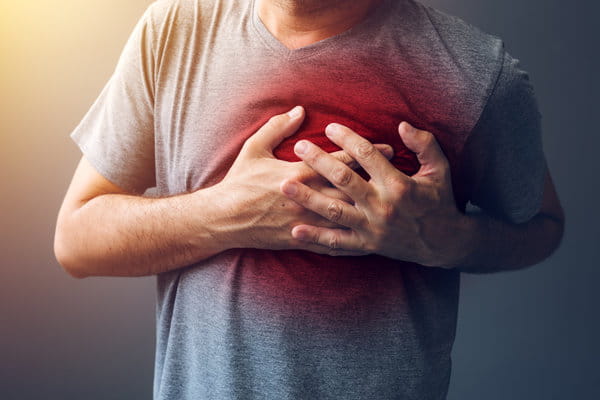Every year over 800,000 people in the U.S. have a heart attack. That translates into one person every 40 seconds.
A heart attack occurs when a blocked artery prevents oxygen and blood from reaching the heart. Without fuel, the heart stops beating – this is known as sudden cardiac arrest. Circulation to the lungs, brain and rest of the body is cut off when the heart stops and the body shuts down.
“During a heart attack, every minute matters. Catching the signs early and seeking help can save your life.” says Edward Chu, M.D., a cardiologist with Riverside Cardiology Specialists.
Learn the signs and seek help immediately
A heart attack doesn’t always appear in real life as it does in the movies. While chest pain and discomfort are the primary symptoms, pain in other areas of the body and indigestion also top the list as frequent signs.
Symptoms that are not well known are often overlooked — causing a delay in treatment. If you experience even one of these symptoms for more than a few minutes call 911 immediately.
- Chest pain or discomfort which includes feelings of fullness, pressure, tightness, aching, burning, numbness, pain and discomfort in the center of the chest. It lasts for several minutes or comes in waves
- Shortness of breath
- Pain or discomfort in the upper body including arms, jaw and back
- Nausea
- Cold sweat
- Lightheadedness
- Fullness, indigestion or choking, described as an intense feeling of heartburn
- Rapid, irregular heartbeats
What to do in case of a heart attack
Always dial 911 at the first sign of a heart attack, even if you’re not sure that’s what is happening. Emergency medical responders can provide help sooner than driving to the hospital.
Don’t delay seeking help
“Many people delay seeking help because they don’t believe they are having a heart attack. They are worried it’s a false alarm, or mistake the symptoms for another health problem like indigestion or arthritis,” says Dr. Chu.
Waiting can mean the difference between life and death. It’s important to call 911 and not a friend or family member as soon as you recognize symptoms.
Create a plan for prevention and action
The best offense is a good defense! Talk to your doctor now to create a plan for both preventing heart attacks and what to do in the event of heart attack.
Lifestyle changes go a long way in preventing heart attacks in the first place. Take steps now that will save your life later:
- Get regular check-ups
- Don’t smoke
- Be active
- Reach a healthy body weight
- Control your blood sugar if you have diabetes
- Take medicine that is prescribed for you and follow the directions on the bottle to make sure you are taking it correctly.
- Eat vegetables, fruits, whole grains, beans, nuts and seeds – all food low in saturated fat, trans fat and sugar, and high in fiber, vitamins and minerals.
Don’t wait, talk to your doctor today and make a plan that is right for you.
Not sure where to go for help? Let our expert cardiology specialists guide you.



